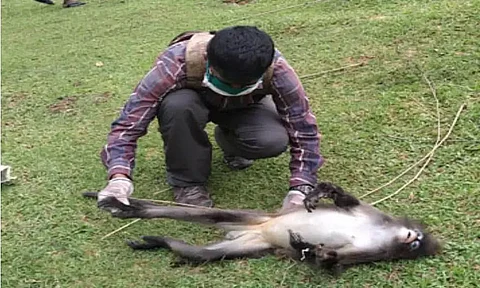
- Home
- Live Blog
- Breaking News
- Top Headlines
- Cities
- NE News
- Sentinel Media
- Sports
- Education
- Jobs

SPECIAL CORRESPONDENT
SILCHAR: Today the day is celebrated as 'World Environment Day' to save greenery, forests and the habitats of species of animals and birds. Saplings are planted to increase greenery. But, after plantation, how much saplings are left uncared for to dry down ultimately, there is no specific data. The day is celebrated with all fanfare and long speeches without much impact on the ground. The endangered species are left to their fate to disappear forever. It is the day when "We have to commit to save forests and greenery as well as the primates," pointed out noted naturalist, Prof Parthankar Choudhury.
Durgakoona, 20 km from here, where the sprawling buildings of Assam University have come up and are expanding, was once a forested area under Dwarbond range and a habitat of rare and endangered species. Still in and around the University campus with rows of trees, bushes and shrubs extending down the Chatla wetland are sighted species of birds and animals. During night in particular, the animals are found moving, often crossing the Silchar-Hailakandi connectivity.
With growing urbanisation, these species will one day decimate and their traces will be just a thing of the past. On June 1, one Phayre's Leaf Monkey, the most endangered primate, has died due to electrocution near the electric power grid of the university. It is important to mention that this rare variety of monkey is found in a limited range in the backyard of the University. They also exist in Sephhijola wild life sanctuary in Tripura and nowhere in the world.
Habitat degradation led to split up of the surviving group. According to information, as a group of 3 or 4 were trying to cross the road from behind the varsity campus, one got injured after coming in contact with low lying high tension wire of the electric substation and succumbed to death. According to Biswajit Singha, a research scholar, working on this species, the low lying electric lines pose a threat to the species fighting for survival. He added to say the habitat is no longer safe for these rare primates.
The well known naturalist and environmentalist of Barak Valley, Parthankar Chowdhury, with his deep knowledge and researched works on biodiversity and the endangered animals expressed his profound anguish at the fact that the monkeys and their shrinking habitat remain unprotected. He pointed out Assam University and its adjoining areas are home to 8 different primate varieties and stand in need of conservation. Since Parimal Suklabaidya, Minister of Forest and Environment, is from this valley, environmentalists and nature lovers in general reach out to him with the appeal to see that the forested areas around Assam University are protected to save the species battling for life.